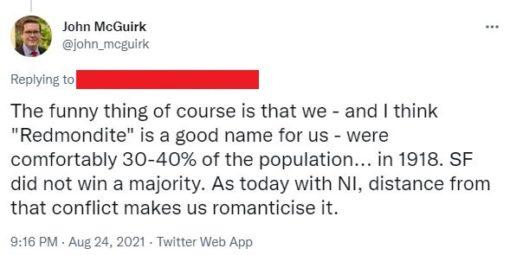“Unfortunately for Ireland, Catholic Emancipation was carried in 1829. ‘Respectable Catholics’ were contented, and became West Britons from that day.” — John Mitchel
Just as the parasite on modern Irish Republicanism has been Marxism, the parasite on conservative movements in Ireland has been West Britonism Inc. (expressed in its contemporary form by Atlanticism, neoconservatism, Christian Zionism and, at best, watered down civic-nationalism). Like the conservative movements it emulates, who have little of their own left to conserve, West Britonism Inc. is defined more and more by its US-style devotion to the State of Israel: a cause both unpopular and unassailable. For a conservative movement always in retreat, the survival of Israel functions as a sort of vindication: patriotism by proxy. In the same way as you will struggle to find a mainstream “Irish republican” voice today who is not a repository of left-wing clichés and a proponent of “no-borders” internationalism, you will struggle to find a “respectable” conservative talking-head who is not a mouthpiece for Israeli interests.



For our generation of Irish nationalists, these tendencies mostly function as red flags. They are indications of subversion either from the so-called left or the so-called right. They characterise movements, platforms and institutions which defer to internal struggles within the failing American Empire. They engage in politics mainly at an NGO level but their influence can be felt in policy. The issue of hate-speech legislation for instance shows the influence of both interests, though you would never think it from the lopsided culture war we watch on television. In the long term, you will find pro-Palestine activists on the left fall foul of “hate speech” laws in the same way you will find Irish nationalists prosecuted for stating once banal truths.
What we as nationalists are concerned about are movements which draw people away from nationalism. If Marxist and neo-Marxist ideas draw people away from authentic nationalism, then that is enough for us to oppose those ideas. If “respectable” conservative movements (cloaking themselves in notions of Christianity or in classical liberalism or even in civic patriotism) draw people away from authentic nationalism, then that is enough for us to oppose them. It is only self-defence after all. Have no mistake that as nationalists we are viewed by these people as a threat. What is more, the people who back these movements view us as a threat.
From our position in 2022, we have all the hindsight that is needed to take full stock of the twentieth century. We do not need to revisit well worn tracks to find out where they lead. People may point to James Connolly’s Marxism or (when they aren’t branding him an anti-semite) Arthur Griffith’s later interest in Jewish nationalists as evidence of a perennial store in such ideas, but these examples are not very instructive. Connolly’s ideas clarified organically towards nationalism. It was his alliance with nationalists and his stand for Irish freedom that defined his legacy. His genuine concern for working-class Irish people is certainly not apparent in the political movements of the left which continue to use his name. Griffith, definitely a “man of the right” if ever there was one, was only ever looking for ways to vindicate Ireland’s sovereign destiny: a reason why models from other nationalist movements abroad were always of interest to him. Connolly never lived to see the genocides of Bolshevism nor Griffith to see the wars for Israel that would mark the last days of Anglo-American expansionism in our own time. Neither lived to see the toxicity of those political ideas warp and destroy the institutions that took them to their hearts and how each in its own way undermined European civilisation. Neither man would be welcomed today by mainstream leftists or conservatives. Each was too much his own man and had too much to say on the “wrong” subjects.
Keeping the Lid on Things
The attitude of mainstream political movements towards their base of support is often condescension and even contempt. We see this on the left, both in Ireland and across the Western world: the suspicion that the “working man” who they presume to champion, is at heart a reactionary bigot. This is the reason why left-wing groupings insist on counter canvassing against the National Party in areas they perceive to be “working class strongholds”. They do not trust their supposed target demographic.
We see the same tendency mirrored on the conservative right. The figureheads of Irish conservatism continually belie the reality of their target audience. The Iona/ Life Institute industrial complex, which broadly accounts for mainstream conservatism in Ireland, is primarily a fire blanket pressed fast against an incendiary base of Catholic nationalism. If the left worries that their base are reactionary racists, the conservative leaders worry in much the same way. They worry that inside every Irish Catholic is a Seán South trying to get out. You will observe that the tone of mainstream conservatism in Ireland is always pitched towards “sounding reasonable”, “not coming off as extreme”, and of course “not being perceived as the bad guy”. This is their shtick. They contrive in fact to see themselves more as “centrists” in a world that has lost all sense of perspective, than as “men of the right” in any true sense.
But their “moderation” is always carefully loaded. Their aversion to radicalism is a rejection of real change. Their pacifism is just a stick to beat physical-force nationalists. Their sense of “patriotism” is anchored in Anglo-American traditions and therefore Liberal Imperialism. Their critique of globalism is anchored in a “clash of civilisations” dynamic where the West is a proxy for Israel: “Freedom and democracy” besieged by “fascist” Islam. If left republicans often seem to care more about Palestine than about Ireland, then Irish conservatives make it clear that the existence of Israel is more important to their general worldview than the existence of their native country.


One of the reasons conservatives cling so easily to pro-Israeli sentiment is that (theoretically) it puts distance between them and the accusation of “nazi” which is the whip that drives the conservative herd. This can be observed most memorably in the United States, where William F. Buckley Jr., founder of National Review, — having purged the conservative movement of “extremists” — was baited into a public outburst by the liberal writer and commentator Gore Vidal during a debate on the Democratic convention in 1968. Vidal had merely to drop the slur “crypto-nazi” to lure Buckley into a tantrum. That brief loss of composure would prove a perpetual wound to his conservative fetish for respectability. For once he had failed to keep the lid on things.
The job of the left is to de-radicalise their legacy base long enough to extort votes from them while conservatives seek to do the same with their followers long enough to pick their pockets. As rabid internationalists, the left are preprogrammed to betray the local interests of their supporters. In the same way, the Anglophiles and neocons of conservatism are preprogrammed to “lead their flock” as far from indigenous nationalism as at all possible. That is to say as far from actual solutions as possible. Whereas the left rely on their support base for votes, the conservative movements (at home and abroad) are more interested in donors.
The War to End All Wars
Eugene O’Neill once wrote: “The past is the present, isn’t it? It’s the future too”. This is as true of history’s spectres as it is of personal demons. In the midst of World War I, it was the German government who put Lenin on a sealed train that started him on his journey to St. Petersburg and it was the British government who mainstreamed the State of Israel as a political objective through the Balfour Declaration. Both acts in 1917 reverberate with us still. The debris of both movements would intertwine in the geopolitical and cultural power-games of subsequent eras, saturating media, politics, war and espionage. Today these two tendencies, like radioactive clouds, blow in across the Atlantic from the epicentre of cultural ferment: the declining United States of America.
Conservatives and leftists of today still draw their energies from the distant tumult of the early twentieth century. If the Bolshevik breakthrough fired on the left, it was the Schofield Bible and the Balfour Declaration that fired on the Christian Zionism which would eventually come to dominate Anglo-American conservatism. Conservatives have always treated the “Great War” with a quasi-religious fervour, whether evoking the heroism of it or the tragedy. In Ireland, the Redmondite tradition which shines through the faux-pacifism of our own conservatives, finds it easier to identify with the “blood sacrifice” on the Somme than on “Sackville Street”. It ties them closer to the British tradition after all. It is West-Britonism in Ireland that has in recent years become the last bastion of pro-Israeli sentiment here.

The disease of the West in modern times has been to dress up its wars in empty moralising, sounding less and less convincing with each passing year. It seems as though these two versions of left and right have become coterminous with a certain idea of the West which is now on the defensive: weakened and dangerous. The baton which passed from London to Washington at Bretton Woods is looking less and less secure. Gazing back on it we see the “blood sacrifice” of the Somme played out in jaded repetition, the “virtues” of empire passing across the Atlantic, conservatives in the United States trading anti-interventionist principles for pro-interventionist principles in the Cold War and the War on Terror, chasing Fascists, Commies and Muslims to the ends of the earth for “freedom and democracy”. Just as Redmond’s cause is dressed up as moderate (despite sending tens of thousands to their slaughter), conservative institutions defend Israel now as a moderating force — “The only democracy in the Middle-East”. And for their part the left do the same for their causes: supporting “protests for democracy” and “regime change” in places where it is geopolitically convenient. Even as their allegiances switch to NATO in the face-off with a now “reactionary” Russia, left-republicans continue anachronistically to drape themselves in Bolshevik clichés, celebrating the Soviet Empire’s decades-long occupation of Eastern and Central Europe as a liberation; as liberating in reality as Israel’s actions in the West Bank.



Conservatism’s New Strategy
For a long time conservative NGOs here could coast by on the existence of the “eighth amendment”, but the defeat of the “No” side in 2018 has meant finding a new reason for people to give them money. They have regrouped by building media institutions to cater for their disenfranchised donor base. In doing so they have consciously sought to encompass not only “pro-life” issues but populist and nationalist concerns as well. They understand that their natural base is limited. West Britonism Inc. cannot travel far under its own steam. In order to remain relevant, its thought-leaders require the radicality of nationalism and the broad church of populism. What we see then is what we see in other countries. The conservatism of retreat survives by leaching off the same “far-right” energies that they vilify. The same leaders who scorned a broad nationalist approach for decades, now attempt to co-opt it as part of a general rear-guard action. It is not even a rear-guard action against liberal hegemony, self-defeating as that in itself might be. It is in practice a rear-guard action for liberal hegemony, because the main outcome is the cutting off of hardline nationalist elements à la Buckley’s strategy of moderation.
It should be obvious to most readers that “controlled opposition” movements across Europe are recognisable by the following characteristics: neoliberal, pro-usury, pro-abortion, pro-war, pro-Israel, exaggerated focus on Islam, and above all the espousal of “civic-nationalism”. Some variation of the above will always characterise the populist firewall but the last point listed will always be present. The rejection of strong ethnic nationalism for European peoples is the reddest of red flags. The “safe” conservative right, represented in the United States by figures like Sam Harris and Tim Pool, in Britain by figures like Douglas Murray and Katie Hopkins, exists in a muted form here in the likes of John McGuirk and David Quinn. Ireland is notable in several respects. We are notable for how limited discussion of immigration has been at any point in the last twenty years. We are notable for how raw and polarising the abortion issue is in Irish culture. We are notable for being so anti-Israel that even the conservative fronts here espouse a certain “even-handedness” — the cul-de-sac debate of “Israel’s right to exist” vs. “the two-state solution” suffices to distinguish conservative populists from the liberal mainstream. But the exact form and presentation should never deceive us. You will always find the momentum of change retarded by the conservatism of retreat. You will always find populist figures pop up just when and where you would expect. And you will always find that conservative money seeps into the broader right, poisoning wells and co-opting legitimate right-wing platforms; draining energy from the genuinely radical.
We see then the attempt at an Irish version of the pro-Israeli Breitbart franchise through institutions like Gript Media, the purpose of which has been to create a broad area of scorched earth between radical nationalism and the mainstream. Breitbart-tier articles about immigration might have been welcome twenty years ago but are by now hopelessly too late. Anything that does not explicitly promote nationalists to the centre of public discourse is a pointless distraction. We see rhetoric contrived to look just tough enough to capture the anti-immigration audience, just pious enough to capture the Catholic audience and just republican enough to appeal to wayward nationalists, but it is in service of an overall project that is one of containment. The conservative movement is always running containment on the best tendencies within its own side. It is always suffocating the radicality of its own base.


The Zemmour Effect
The outcome of the conservative project is the Zemmour effect. In France, Marine Le Pen was encouraged for decades to moderate. She threw her own father under the bus to avoid the accusations of “far-right” extremism. The problem is that in conceding the ground of radicalism, you leave yourself open to be outflanked. She moved to the centre to court liberal and Zionist approval, only for them to create a new “far-right” candidate and pump him up into an international celebrity. As he deploys rhetoric that would get other people arrested and thrown in jail, this man who was practically unknown outside of France is built up in the British and American press. These things do not happen by accident. It is clear that many of the same interests who demanded Le Pen moderate are now rushing to back Zemmour, either to spoil the nationalist vote or just to bulldoze Le Pen.
When the “respectable voices” call for you to moderate, what they are really calling for is you to move aside for something else: something they control. We can assume that medium-to-long-term, the goal of the conservative movement in Ireland will be a Zemmour effect. That is to say the creation of a controlled populist candidate who will have overnight media hype and who will play on neoconservative talking points about migration, or perhaps will focus on some other issue entirely. In the end he or she will betray the base of their support because it is in their nature to do so and because the nationalism that pays for their champagne is not Irish ultimately but Israeli. They may or may not do well politically but the point is not necessarily to succeed.
You can be sure that if a Zemmour-type figure emerges, he or she will not only find backing in the flagship conservative outlets, but in their front subsidiaries. The people too “respectable” to report on or actually support the nationalist movement in Ireland will drool over this manufactured insurgent. Why? Because he or she “is news”. Just like Zemmour “is news”. A whole network of institutions ranging from reactionary-populist to republican-nostalgic will throw in their lot, either because they have been funded by, taken over by or actually created by the controlled conservative right. Foreshadowing of figures like this comes in instances like Peter Casey or Kevin Sharkey, figures who are not really ideological but who become brief media sensations on account of colourful pronouncements. People always become excited by these figures and even buy into them against their better judgement. Zemmour’s bombastic rhetoric is rationalised. “A Jewish man can say these kinds of things,” we are assured, whereas if Le Pen said them she would be attacked as “too extreme”. It’s the old story of people trying to be too clever and outsmarting themselves.
One must never underestimate the gullibility of crowds, however clever or however clued in. Those who roll their eyes at their neighbours for sheepishly following the RTÉ narrative are themselves often in thrall to a Twitter feed of inevitable confirmation bias. Social media is largely just “the news” in atomised form, refracted endlessly through willing participants, each person racing to break the story first, editorialise it best, get the most likes and retweets, etc. Such phenomenon are easily manipulated, especially by hope. People who claim to believe nothing they see in the mainstream media are increasingly inhabitants of a virtual world in which only “the news” exists. When the media switches off Le Pen and switches on Zemmour, the result is like lightening through the newsfeeds of a billion political junkies, each trying to outsmart the next.
Going Forward: The Game to Isolate the “Far-Right”
What we can expect long-term from the Irish conservative movement is par for the course. They will do what it is in their nature to do. Everyone wants to be the big fish in the pond. Conservatives have lost most of their status in Official Ireland so must content themselves with controlling the disenfranchised right. Their aim will be to gain controlling interests in a network of institutions capable of providing a bulwark against a “far-right party” or in other words a party they cannot control. Inevitably that means the National Party as it is conspicuous that we are the only organisation in Ireland who the conservative movement brands as “far-right”. The rest — regardless of how extreme their behaviour or rhetoric becomes — are given a pass as respectable. What we can infer from this is that the National Party are the one organisation who are not “acceptable” to the pro-Israeli right, any more than our existence is tolerable to the Marxist left.

What is more worrying is that their tentacles will inevitably ensnare better people, whether the cynical or the well-meaning. It may even be that the reader of this article is an unknowing member of an organisation which is already in their control, for there must already be many. In a world in which nationalism is increasingly persecuted, money and status are strong inducements, and it is only over the long distance of years that the pattern of betrayal emerges. Of course all these things start small. Selling out rarely starts as selling out. Trivial amounts of money, growing over time to a dependence, this is the way these things usually go. We will see this filter out into cultural and political fronts across the island. Anything that shelters under the umbrella of the controlled right in Ireland will inevitably be a function of it, whether they are believers in it or not. As the old saying goes, “He who pays the piper calls the tune”. So it is and shall ever be, treachery without end. Against Marxism on the left and worship of Israel on the right, we must be vigilant.
This article was submitted by a National Party member. If you would like to submit an article for publication on the National Party website, follow this link.

